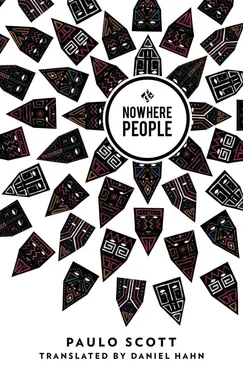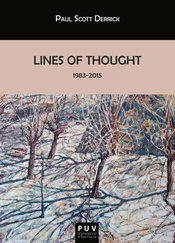Paulo Scott - Nowhere People
Здесь есть возможность читать онлайн «Paulo Scott - Nowhere People» весь текст электронной книги совершенно бесплатно (целиком полную версию без сокращений). В некоторых случаях можно слушать аудио, скачать через торрент в формате fb2 и присутствует краткое содержание. Год выпуска: 2014, Издательство: And Other Stories Publishing, Жанр: Современная проза, на английском языке. Описание произведения, (предисловие) а так же отзывы посетителей доступны на портале библиотеки ЛибКат.
- Название:Nowhere People
- Автор:
- Издательство:And Other Stories Publishing
- Жанр:
- Год:2014
- ISBN:нет данных
- Рейтинг книги:3 / 5. Голосов: 1
-
Избранное:Добавить в избранное
- Отзывы:
-
Ваша оценка:
- 60
- 1
- 2
- 3
- 4
- 5
Nowhere People: краткое содержание, описание и аннотация
Предлагаем к чтению аннотацию, описание, краткое содержание или предисловие (зависит от того, что написал сам автор книги «Nowhere People»). Если вы не нашли необходимую информацию о книге — напишите в комментариях, мы постараемся отыскать её.
Driving home, law student Paulo passes a figure at the side of the road. The indigenous girl stands in the heavy rain, as if waiting for something. Paulo gives her a lift to her family’s roadside camp.
With sudden shifts in the characters’ lives, this novel takes in the whole story: telling of love, loss and family, it spans the worlds of São Paulo’s rich kids and dispossessed Guarani Indians along Brazil’s highways. One man escapes into an immigrant squatter’s life in London, while another’s performance activism leads to unexpected fame on Youtube.
Written from the gut, it is a raw and passionate classic in the making, about our need for a home.
Nowhere People — читать онлайн бесплатно полную книгу (весь текст) целиком
Ниже представлен текст книги, разбитый по страницам. Система сохранения места последней прочитанной страницы, позволяет с удобством читать онлайн бесплатно книгу «Nowhere People», без необходимости каждый раз заново искать на чём Вы остановились. Поставьте закладку, и сможете в любой момент перейти на страницу, на которой закончили чтение.
Интервал:
Закладка:
It is the second time Paulo is trying to change gears in the Ford Fiesta they have just hired; he bangs the door with his fist and realises that same second that he needs to use his left hand and to stay on the left-hand side, particularly on the minor roads like this one that he has taken to reach the house of his Portuguese workmate, the guy who is going to join him and the two Moroccans who also work at the bar, one as a busboy and the other as a bartender (in whose name the car was rented, since Paulo has no passport or papers); none of them wanted to drive the car in that busy traffic because, despite having licenses, they haven’t had much practice. The drizzle will complicate matters a bit, but it’s part of the fun of getting out of the city and curing a hangover on the road to Newquay, a surfer beach in the south-west of England. Driving is just another reason to stop thinking about everything that has happened in the last few months. The Portuguese guy gets into the car, says he’s going to surf every wave and fuck all the girls they find and that as soon as they’re out of London he will take over the driving and show them how you drive on a European motorway, something he’s sure doesn’t exist in Brazil. Paulo isn’t good at handling the Portuguese guy’s agitation, he’d imagined that his colleague would be calmer outside work but apparently not, just the opposite. He says he needn’t wait till they have left the city if he really wants to drive, he can take the wheel right now. He gets out of the car and from outside gestures for him to do the same. They swap seats. Paulo feels the weight of his hangover. Up till this moment he has managed not to think about what the Lebanese men had said to him the night before. After pouring them two glasses of Moosehead beer and telling them that with this month’s interest and everything else he now owed them the final two hundred and sixty pounds, after which he will have settled his debt, that he would be giving them the money in forty minutes when he went on his break, he heard the older one saying they had decided to charge him a two thousand pound fine for Rener having left London without their permission. Paulo said nothing, went back to serving the group of yuppies who were waiting for him at the other end of the bar. On his break he went down to the staff room, opened his locker, took out the money and outside he handed the two hundred and sixty pounds to the Lebanese men, asking when they were going to give him back his passport and the rest of his documents. He knew the answer already, but he wanted to hear it all the same: only when he paid up the fine. He looked up, trying to see the London sky which in the centre of town always hides the stars, he turned his back on them and — even though there were still fifteen minutes left to the end of his break — returned to work, took a bottle of bourbon without checking whether the manager was watching him or not, poured himself a glass with some ice and Coke, the official drink of any self-respecting bartender, and started to drink. The Portuguese guy won’t shut up shouting Alright like a madman, imitating a Texan accent, overtaking cars on the motorway, gesturing at their passengers, especially when they are women. The soundtrack is The Cult played at maximum volume. Paulo is really annoyed now, he turns off the music and, speaking in Portuguese, mostly so that the Moroccans don’t get involved, he tells the Portuguese guy that he’s the biggest idiot on the face of the earth and to pull the car over immediately. He thought he would get the chance to rest on this trip to the coast, but running away from your problems, even those that have just appeared at the last minute, is an inexcusable fault. The Portuguese guy pulls towards the hard shoulder and stops the car. Paulo gets out, saying he is going to take over the driving, the other guy doesn’t argue with him. Paulo apologises to the Moroccans and says that from here on in only he will drive. They get back on the road. Paulo drives at more than a hundred and forty (the car has a good engine, the road is excellent; Jaguars, Mercedes-Benzes, Porsches pass them at more than a hundred and sixty), one thought is supplanted by the next, he tries to predict what he will do when they get to Newquay, what it’ll be like in the B&B, since they haven’t made reservations, what it will be like dealing with the Portuguese guy who has gone into a sulk and hasn’t spoken another word, how he’s going to be able to wrench his passport from the Lebanese men, what he will do if the car is stopped for some reason and they ask for his license, what he’ll do to go back to having a life in Brazil, when he will go back to Brazil, when he will see Rener again, what it’ll be like when he tries to find Maína, when he will go back to being proud of his country, when he’ll have more news of what’s happening in Brazil, how he’s going to manage to get to sleep like a normal person, when he will stop giving himself a hard time, when he will reach the top of the world, and he hears the phrases I won’t make it and It doesn’t matter what I do, God doesn’t exist. He sees the caramel and white cocker spaniel at the side of the road (he isn’t sure if he really does see it, he isn’t sure of anything), and panic sets in. Scared to breathe, scared of not being able to breathe any more, scared to talk, of not being able to talk, not being able to swallow, scared to think, of not being able to stop thinking. He pulls over, opens the car door, gets out, his steps shaky, holding his head as though it might come unstuck from his neck, walks off the road and kneels down looking at the ground, the ground which at this moment looks like nothing, his eyelids almost shut. The others get out of the car, ask what’s going on. He says quietly that he is going to die, he says it in Portuguese, he says it in English. He can’t stop thinking. He says he’s about to have a heart attack. The world is never going to change. There is no meaning to life. And nothing can be more futureless (and hopeless), more awful and terrifying.
Luisa and her reason
Nineteen ninety-three (Luisa never returned to Rio de Janeiro).
The doctor they interviewed weeks earlier at the meeting with representatives of the National Association for Indigenist Action in Porto Alegre spoke emphatically about that Indian girl, aged seventeen or eighteen, called Maína, about how they really needed to meet her in order to understand properly what it is that modern life is doing to the current generation of Indians in Rio Grande do Sul, to people who have never before had to live with all this technology and so little space and such poor conditions. They no longer have the recipes for medicines and traditions for healing from decades past, they don’t have places where they can find leaves, roots, herbs, there is no jungle and there is no countryside, there is only this relationship of always failed rapprochements, and the distrust they feel about accepting the medicines offered to them by non-Indians. ‘You people have a translator, don’t you?’ the doctor asks. ‘You should start in the villages, but do also speak to the ones who live on the roadside, do speak to the younger women, they have a lot more to say, specially the one I mentioned. Don’t forget, write it down.’ And Luisa wrote it down. Luisa has been telling Henrique that they need to hire an Indian secretary. Henrique, who is actually Henrique Magalhães Becker, eleven years older than her and a trained geographer with two master’s degrees, in Human Geography and Statistics, and two doctorates, in Management and Geography, her professor in one of the extra modules she made herself attend during the master’s since she wasn’t getting as involved in the Porto Alegre social scene as she had planned and as a result had plenty of time left to devote to her studies; Henrique, the man of multiple allegiances, confident and practical, who, in that first semester of nineteen ninety-one (and already three seminars into the module by the time she came to give her presentation) became the love of her life. And she, Luisa Vasconcelos Lange, did not rest until she had managed to take him to bed, until she had made him fall in love with her and hold her hand in front of the other master’s students and professors on the postgraduate course and invite her, as soon as she had defended her dissertation with honours, to live with him in his house, which, as the only grandchild, Henrique had inherited from his maternal grandfather, a narrow building on a long strip of land with a great patio, a barbecue, two plum trees and a vegetable garden round the back; number eight hundred and thirty-nine Cristovão Colombo, near the corner with Ramiro Barcelos. The problem isn’t with the Indians they are going to interview. The translator is excellent, a white boy currently doing a master’s in Language and Literature at the Santa Catarina Federal University, but, hard-working as he might be, he won’t be able to help them map out the Indians’ profile in the minute detail — using audiovisual media to make a documentary record — that they have been hired by the Getúlio Vargas Foundation to provide, mapping the broadest picture they can of the status of the Kaingang and Guarani Indians in Rio Grande do Sul, an undertaking that will require three months of intensive fieldwork and a further two tackling data, recent bibliographies, press cuttings, surveys in partnership with public institutions, and the preparation of documents and reports. Luisa still has not understood why Henrique agreed to take this project on, the money is not much compared to what he is used to earning, she imagines he took the opportunity to give himself a break from the work he has been doing for big corporations; he won’t earn what he hoped to, but he will be able to travel around the state, understand the lives of a people about whom nobody ever talks (he once said to Luisa that despite his Germanic biotype he has Indian blood; his great-grandfather, a Chilean Indian, was abandoned at the entrance to a farm in the south of Chile, brought up by a family of Spaniards as though he were their biological son, and ended up on the border of Uruguay and Rio Grande do Sul, where he married an Italian widow who owned an inn and with whom he had four children, among them a daughter with very light skin, Henrique’s grandmother, who came to study in Porto Alegre, married a businessman from the Lageado neighbourhood and had just one child: his father); this was the closest he came to what could be called a break from the consultant’s routine he has devised for himself.
Читать дальшеИнтервал:
Закладка:
Похожие книги на «Nowhere People»
Представляем Вашему вниманию похожие книги на «Nowhere People» списком для выбора. Мы отобрали схожую по названию и смыслу литературу в надежде предоставить читателям больше вариантов отыскать новые, интересные, ещё непрочитанные произведения.
Обсуждение, отзывы о книге «Nowhere People» и просто собственные мнения читателей. Оставьте ваши комментарии, напишите, что Вы думаете о произведении, его смысле или главных героях. Укажите что конкретно понравилось, а что нет, и почему Вы так считаете.












